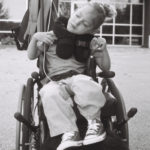THE PROJECT:
NORML member Karin Chester is on a mission to document and tell the stories of a just a few of the potentially thousands of people in the state of Missouri that have medical conditions which can be effectively treated and sometimes cured with Medical Cannabis, even when pharmaceutical treatment has failed. Cannabis is used to alleviate the symptoms of many different diseases and disorders, but in Missouri, use is limited to CBD oil derived from Industrial Hemp and only for those diagnosed with Intractable Epilepsy. Chester is passionate about this cause. “For me, legalization is about PEOPLE who need safe effective medicine; people who have diseases and disorders that are being ineffectively treated with pharmaceuticals that are known to be dangerous, addictive, and sometimes deadly. Often the treatments are worse than the disease itself. There is a better way. Patients and their families deserve to have every treatment option at their disposal.”
PURPOSE:
- To photographically and biographically document and record the lives and stories of current and potential patients who may be helped by Medical Cannabis.
- To use these records to create awareness among the general public and medical community as to the many illnesses and conditions that can be treated with Medical Cannabis.
- To use the project to support Missouri Medical Cannabis legalization efforts.
Join with Greater St. Louis NORML on this important project to educate the public on Medical Cannabis therapy.
HOW YOU CAN HELP:
- Contact Missouri Legislators to educate them about Medical Cannabis and how it can be used as a safe and effective treatment for a multitude of illnesses including Autoimmune Disease, PTSD, Multiple Sclerosis, Cancer, as well as offering a safer alternative to Opioid pain killers.
- Follow the Missouri Patient Project on Facebook, @MPatientProject on Twitter, and MissouriPatientProject on Instagram. Spread the word through social media by Liking and Sharing our posts and asking your friends to do the same.
- Support Greater St. Louis NORML by attending a meeting or coming to a Happy Hour with us.
- Donate: Visit the GoFundMe page here. Any money raised outside of Project costs will go directly to efforts to Legalize Medical Cannabis in Missouri.
PATIENT 1: AYDEN “G” MARKUM AGE: 3
Ayden’s Story
Ayden rarely sleeps through the night. He’s restless. Sometimes he’s in pain. His parents — Ashley and Chris — take shifts with him on nights when Chris is home. He works full time as an Orthopedic Surgical Nurse, mostly graveyard shift so he can help Ashley during the day. Ashley almost always has a smile on her face but sometimes she lets the façade slip and you can see how tired she must be. Chris too. But the devotion they have to each other and to their family is almost tangible.
Ayden is almost 4 years old and is the youngest of five. Isaiah is eleven and looks like his mom with his darker hair, but he has his dad’s quiet strength. He stays out of the line of sight of my camera as much as possible but he watches all the action. Eliza is ten and also has Ashley’s dark hair but her nose is smattered with beautiful golden freckles and there is a wisdom in her eyes that is far beyond her age. She has a quick smile and often, she is the one in the rocker with Ayden, talking to him and soothing him when he cries. Asa is seven, and Asher is five, but they shadow each other constantly. Asa is not talkative, but you can see the wheels turning as he checks out the camera I’m holding, then suddenly he darts away and goes to stand by his dad; but he continues to watch me. Asher keeps telling me not to take his picture but then he pops up right in front of me no matter where I am. Ayden resembles Asa the most, with golden and light brown locks and eyes that are crystal blue. Ashley and Chris homeschool and, while we are talking, the dining room has been transformed into a classroom. While Ashley is working with the kids, Chris is in the kitchen starting dinner.
During the daytime, Ayden is being held or engaged almost constantly. The rocking chair in one corner of the dining room is often occupied by someone cradling him, talking to him, singing to him. The pole that holds the pump and bag for his feeding tube is always close by and it is sometimes difficult to maneuver Ayden with the thin plastic tube surgically inserted right between his sternum and belly button. His body is stiff and rigid, but his neck is floppy and he cannot always hold it up without help. He smiles a lot. It is beautiful and bright and joyful. If you blow on his face lightly he will giggle.
But he cries, too. He gets uncomfortable and his body suddenly spasms and stiffens completely. Every muscle in his body is clenched. He has had these kinds of spasms for hours at a time, his body never relaxing. Even the muscle relaxers prescribed by his doctor don’t always offer relief. When you look into his eyes, sometimes he is very present, holding your gaze and seeing. Other times his eyes are vacant and haunting. Although his eyes work, his brain doesn’t always receive or understand the signals.
He participates in Physical, Occupational, Vision and Speech Therapy. The therapists come to work with him, and I watch as the Occupational Therapist, Kim, manipulates Ayden’s head as he lays on a thick quilt folded on the floor. Ashley and Kim pick up the blanket like a swing and begin to rock Ayden. His face lights up and the giggles bubble into the air.
At 36”, Ayden is tall for his age. He was tiny when he was born though — just 2 lbs. 10oz. He suffered a brain bleed at birth, which is a fairly common occurrence with premature births. He spent 98 days in NICU, and his first diagnosis was Cerebral Palsy. Seizures started when he was 18 months old, and he was diagnosed with Infantile Spasms. His doctors started him on anti-seizure meds immediately.
Ayden suffered liver damage from one medication, despite the fact that he was given another medication specifically to prevent this side effect. One of the other medications caused Ayden’s esophagus to atrophy so he could no longer swallow. That is when they inserted the feeding tube. Neither of those two drugs, nor any of the others they tried, helped the seizures. They actually caused new problems and made him much worse, which shifted his diagnosis to Intractable Epilepsy. That means that he has seizures that cannot be controlled, and it is the only diagnosis in Missouri that can currently be treated with CBD oil.
Ayden recently started on a new CBD oil blend from the Noah’s Arc Foundation. It’s called Elysia and it has the highest CBD concentration in the United States. It is a proprietary blend of two strains of low THC industrial grade Hemp and essential oils. (Missouri law mandates that THC levels must be below 0.3%. The current batch of Elysia tests at 0.19%) It has been the most effective medicine for Ayden so far. As of this writing, he has gone as much as 15 days without a seizure. Previously, the longest he’d been seizure free was two to three days. He is also beginning to gain better control of his neck and put weight on his arms and upper body. As much as the CBD has helped and will continue to help Ayden, full flower Cannabis (as opposed to industrial grade hemp) would actually help him a great deal more. The body’s Endocannabinoid System uses THC as a catalyst, opening up cannabinoid receptors, helping the CBD be absorbed more efficiently. THC also relieves pain and fatigue, which will make it easier for Ayden to sleep.
The main danger that Ayden faces now and for the rest of his life, is that uncontrolled seizures can cause sudden death. Sudden Unexpected Death from Epilepsy (SUDEP) is the leading cause of epilepsy-related death. It usually occurs while the patient is sleeping, and there may or may not be evidence that a seizure occurred. For Ayden, the hope is that continued use of the CBD oil, and ultimately treatment with Cannabis instead of just industrial grade hemp, will keep his seizures under control and thereby lessen his chances of SUDEP. Ayden and thousands of kids like him NEED the medicine that Cannabis offers. The reality is, it is his best and only hope.









